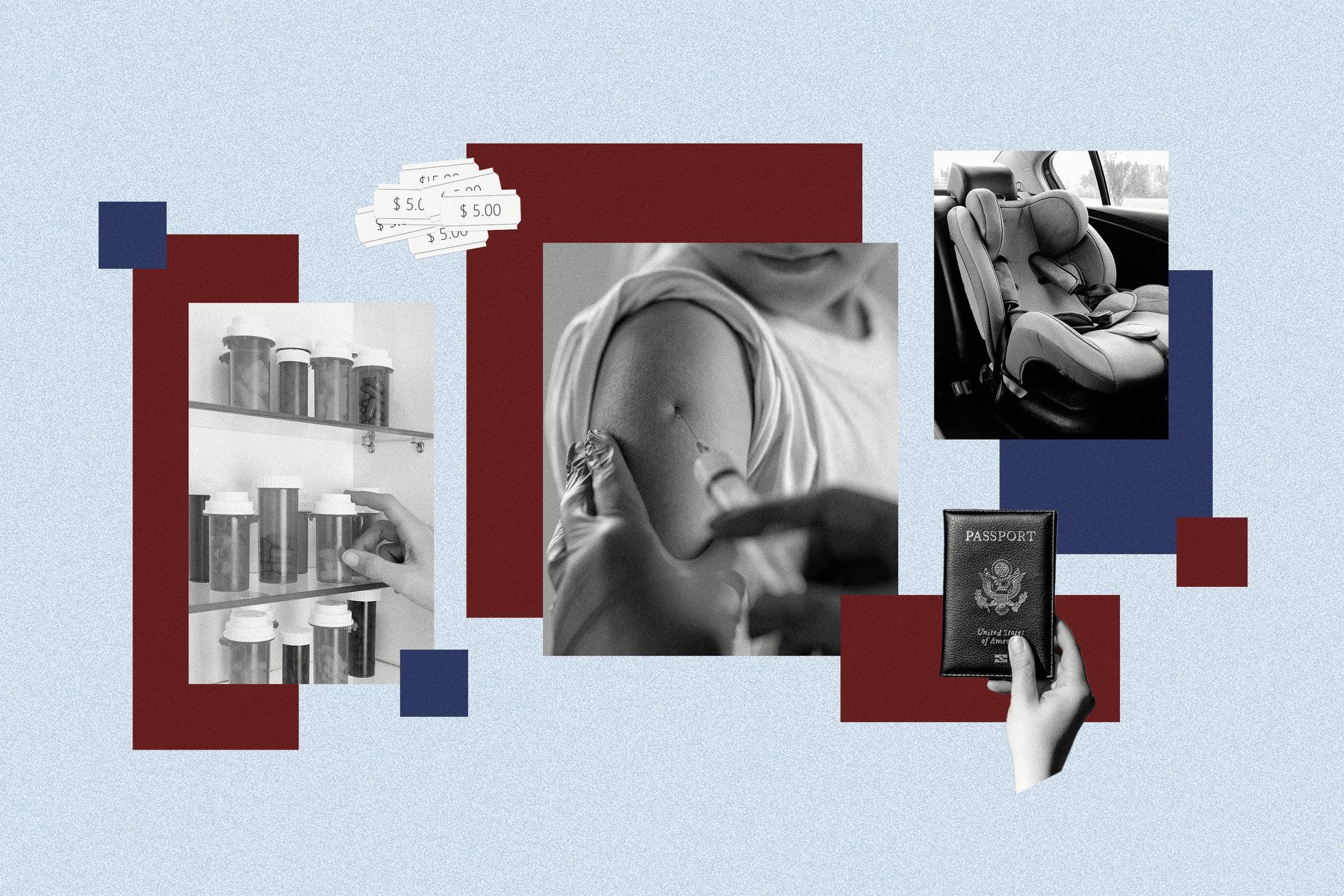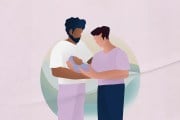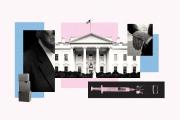Updating passports. Taking self-defense classes. Stocking medication. Bracing for price hikes. These are all different ways that women and LGBTQ+ people are preparing for life under a second Trump administration.
President-elect Donald Trump is filling his prospective Cabinet with loyalists and promising to drastically reshape the federal government in ways that could raise day-to-day costs for Americans.
Through phone calls, emails, and Instagram messages with our reporters, readers of The 19th shared how they are getting ready for Trump to take office in 2025 and how differently — or not — they prepared for his first presidency in 2016.
‘I’m going to be as loud as I possibly can’
Lucy Mac moved to Raleigh, North Carolina, three years ago. For a Democrat and lifelong New Yorker, life in the South was a culture shock — especially when she saw the Trump bumper stickers. Although Raleigh is a predominantly liberal part of North Carolina, Mac hadn’t lived someplace where some of her neighbors so openly support Trump. But she doesn’t plan on leaving.
“Moving is such a privilege. I don’t have money to just pick up and move,” said Mac, who works as a community event director. She wouldn’t be able to go back to paying New York rent; the apartment where she used to live now costs almost $6,000 a month. She also doesn’t want to run away from her fears.
At least one friend has asked: Won’t she scare off potential customers by sharing her opposition to Trump on social media?
No, she said. “I’m going to be as loud as I possibly can in this community because I want to make sure people know that they are not alone. So I don’t have any intention of running, going back anywhere more liberal, because I can’t afford it. And I don’t see the value in that,” she said.
To Mac, places like Raleigh are where her voice is needed more. She knows she’s not the only one who feels like she does, but the outrage is muted compared to being in New York City when Trump was elected in 2016. She worked for AOL at the time and the company gave everyone the day off when the results came in.
“If you did decide to go into the office, there were therapists on site. There were people giving out hugs as you got into the building. Just the entire feeling in New York was so somber, so definitely very different,” she said.
She’s worried about her rights as a woman under an administration that may enact the policy proposals of Project 2025, a 920-page blueprint for Trump’s presidency authored by the conservative Heritage Foundation. She’s organizing a local self-defense class for women and plans on updating her passport, which still has her maiden name on it, to match the married last name on her driver’s license. She’s worried that, under Trump, that discrepancy could keep her from being allowed to vote.
If implemented, the policies in Project 2025 would broadly undermine voting rights and prosecute election officials for essentially doing their jobs. Although the plan does not propose specific restrictions on women’s eligibility to vote, John McEntee, a former staffer in Trump’s White House and senior adviser to the Heritage Foundation’s Project 2025, suggested in a TikTok post last November that only men should be able to vote.
-
Read Next:
‘Things are going to get tight’
Trump’s election in 2016 caught Eleanor Grano off guard.
“I don’t think I was prepared at all,” she told The 19th. “I wasn’t prepared for how to pace myself for the urgency that a Trump presidency caused.”
Her response was to throw herself into her abortion advocacy work. With the landscape of federal courts becoming more conservative and abortion access being restricted — particularly in places like Texas, where Grano lived at the time — working felt like the only way to channel her stress. At one point, she was working 70- and 80-hour weeks. Her health deteriorated and she developed fatty liver disease due to lack of physical activity. Since then, Grano said she has worked to prioritize her health.
Part of that work has required planning for Trump’s second term in office. Now 38 years old and a new mom, Grano said she is concerned about elevated costs for goods if Trump follows through with a campaign promise to impose tariffs on imports from Canada, Mexico, China and other key trading partners. The nonpartisan Tax Policy Center estimates that the tariffs could increase household taxes by an average of nearly $3,000 in 2025. It would affect a variety of products for parents, including clothing and toys.
“My child is two months old, and he grew out of his car seat within those two months,” she said. “So, I’m thinking about buying another car seat before the tariffs hit. Most car seats are created in China, so that’s a 60 percent tariff.”
Then there’s the Kendamil baby formula that she buys from the United Kingdom — and the potential rise in the cost of child care when she and her husband put their son in a daycare in January. Grano and her husband, who live just outside Chicago, are thinking about all the ways expenses for their growing family will add up if the economy shifts. Grano also questions if they can afford to have another child and what that process might look like. They still need to speak in more detail about it to figure out where they can cut costs, she said. Grano works at an abortion fund and her husband is a university professor. She feels fortunate they are in a good financial place right now, but she knows “things are going to get tight.”
-
Read Next:
‘I’m worried about their health’
For Selene, a self-employed licensed clinical social worker living in Morris County, New Jersey, her future children are her first concern under a second Trump administration.
“With kids right on the horizon … I’m worried about their health,” she said. “I’m worried about sending them to school if vaccines are no longer mandated. I’m worried about, if they do have special needs, that the federal funding for special needs programs will be gutted. I’m worried about tolerance and people’s behavior.” The 19th is only using her first name due to privacy concerns around her workplace.
She moved to New Jersey with her partner only five months ago. The plan was to settle down, have kids and raise them close to her partner’s family, in a more affordable area than where she grew up in California. But now that Trump is taking office again, that timeline to start their family has changed. She wants to raise her kids elsewhere.
The suburban and rural area where they live now is mostly White, she said, and lawn signs and flags for Trump are frequently on display when they drive through town. The other New Jersey communities that they could one day afford to own a home in are also mostly conservative. She doesn’t know if her kids will grow up to be gay or transgender, and she wouldn’t want them exposed to casual anti-LGBTQ+ rhetoric from their neighbors.
So now they’re moving, again, to the Hudson Valley region of New York. That will take them an hour and a half away from her partner’s family, cutting them off from the nearby support that they had planned on.
“I just want to find that community where I know my family is safe, so then I can go fight for other people’s families,” she said.
-
Read Next:
‘These policies don’t take care of people’
April Wazhaxi-Jones’ planning for the Trump administration centers around maintaining her personal safety and the well-being of other Indigenous people. She lives in Oklahoma and is a member of the Osage Nation, but the area where she resides is mostly White. Throughout this year’s presidential campaign season, she saw Trump signs and flags sprinkled throughout neighborhood yards.
She recalled times when she and her husband greeted neighbors passing by and were met with silence or stares. Just a few days before speaking with The 19th, Wazhaxi-Jones said she was at Home Depot and a man wearing a Trump hat and shirt stared at her as he blocked her way down the aisle.
“You’re excused,” she remembered the man saying sarcastically as Wazhaxi-Jones stepped around him to walk by.
As an Indigenous woman in the United States, she knows well that threats of violence and the erasure of history are nothing new for the country. But this moment feels different for her.
“I feel as though we as Indigenous people were finally having a voice, finally being heard,” she said. “We had Deb Haaland as secretary of interior and now that’s gone. And not only is that gone, but my rights as a woman, the right to love who you want are under attack. We Native Americans take care of each other — and these policies don’t take care of people.”
In the past, Wazhaxi-Jones said she did what she could to educate people who expressed political opinions that conflicted with her own. She won’t be doing that moving forward. Her focus now is self-care and making sure her Indigenous and two-spirit friends and family have resources they need.
She knows someone who had breast reduction surgery while it was still covered by their insurance. She knows people who are trying to get alternative forms of gender-affirming care lined up and others who are stocking up on plan B. For her own peace of mind, Wazhaxi-Jones is in counseling, deleted social media and is limiting her consumption of news about Trump and his administration. She also does not go out as much as she used to.
“Everything I believed in is being torn down. I’m exhausted and it’s all just too much. I am one voice and it has been stomped out,” she said.







